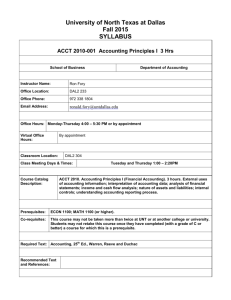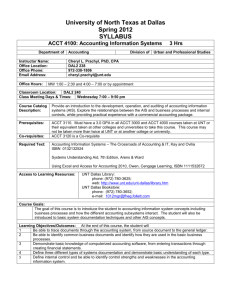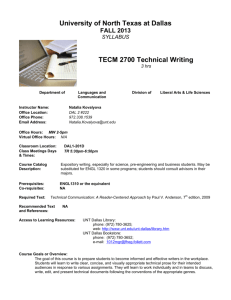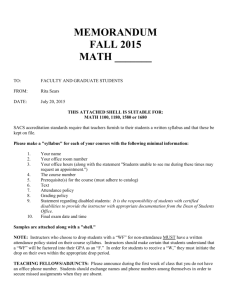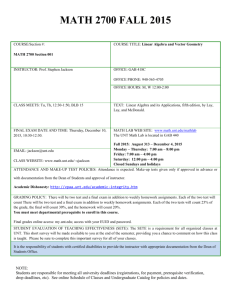University of North Texas at Dallas Fall 2015 SYLLABUS
advertisement
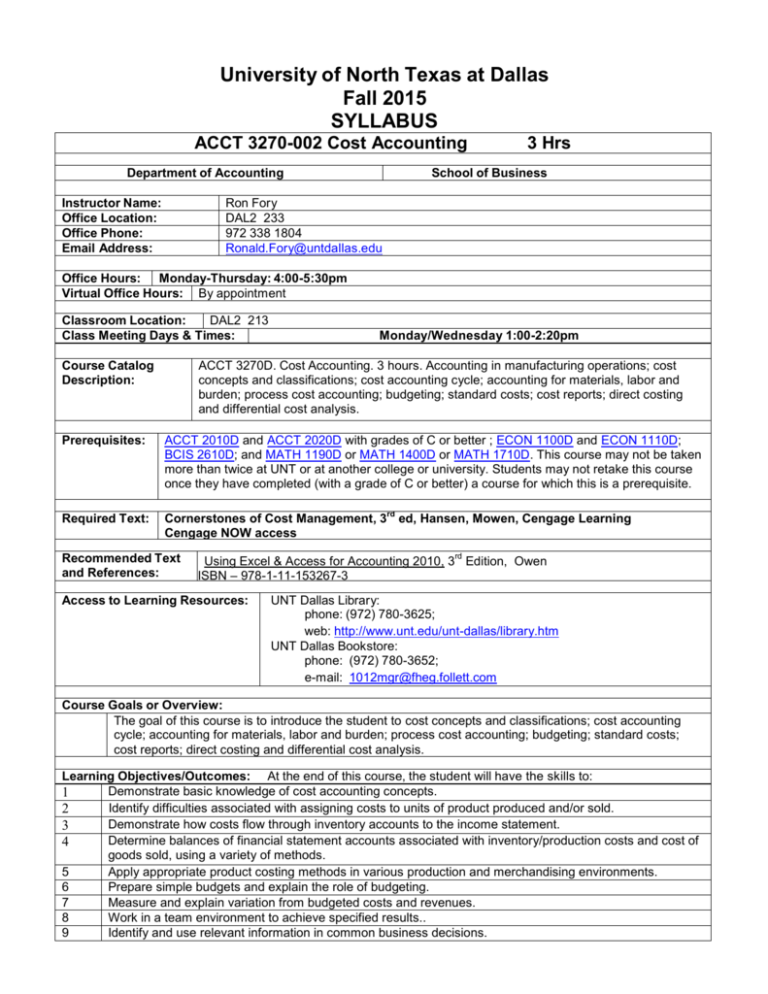
University of North Texas at Dallas Fall 2015 SYLLABUS ACCT 3270-002 Cost Accounting Department of Accounting Instructor Name: Office Location: Office Phone: Email Address: 3 Hrs School of Business Ron Fory DAL2 233 972 338 1804 Ronald.Fory@untdallas.edu Office Hours: Monday-Thursday: 4:00-5:30pm Virtual Office Hours: By appointment Classroom Location: DAL2 213 Class Meeting Days & Times: Course Catalog Description: Monday/Wednesday 1:00-2:20pm ACCT 3270D. Cost Accounting. 3 hours. Accounting in manufacturing operations; cost concepts and classifications; cost accounting cycle; accounting for materials, labor and burden; process cost accounting; budgeting; standard costs; cost reports; direct costing and differential cost analysis. Prerequisites: ACCT 2010D and ACCT 2020D with grades of C or better ; ECON 1100D and ECON 1110D; BCIS 2610D; and MATH 1190D or MATH 1400D or MATH 1710D. This course may not be taken more than twice at UNT or at another college or university. Students may not retake this course once they have completed (with a grade of C or better) a course for which this is a prerequisite. Required Text: Cornerstones of Cost Management, 3 ed, Hansen, Mowen, Cengage Learning Cengage NOW access Recommended Text and References: rd rd Using Excel & Access for Accounting 2010, 3 Edition, Owen ISBN – 978-1-11-153267-3 Access to Learning Resources: UNT Dallas Library: phone: (972) 780-3625; web: http://www.unt.edu/unt-dallas/library.htm UNT Dallas Bookstore: phone: (972) 780-3652; e-mail: 1012mgr@fheg.follett.com Course Goals or Overview: The goal of this course is to introduce the student to cost concepts and classifications; cost accounting cycle; accounting for materials, labor and burden; process cost accounting; budgeting; standard costs; cost reports; direct costing and differential cost analysis. Learning Objectives/Outcomes: At the end of this course, the student will have the skills to: Demonstrate basic knowledge of cost accounting concepts. 1 Identify difficulties associated with assigning costs to units of product produced and/or sold. 2 Demonstrate how costs flow through inventory accounts to the income statement. 3 Determine balances of financial statement accounts associated with inventory/production costs and cost of 4 goods sold, using a variety of methods. 5 Apply appropriate product costing methods in various production and merchandising environments. 6 Prepare simple budgets and explain the role of budgeting. 7 Measure and explain variation from budgeted costs and revenues. 8 Work in a team environment to achieve specified results.. 9 Identify and use relevant information in common business decisions. Course Outline This schedule is subject to change by the instructor. Any changes to this schedule will be communicated by announcement in class and via Blackboard and Connect as soon as the need for the change is determined. TOPICS TIMELINE 1. Cost Management Concepts 08/24-26 Cornerstone Ex 02.02, 02.03, 02.04, 02.05, 02.06; Ex 02.11, 02.13, 02.14, 02.15, 02.18 2. Cost Behavior 08/31-09/03 Cornerstone Ex 03.01, 03.02, 03.04, 03.05, 03.07, 03.08, Ex 03.09, 03.10, 03.12, 03.13, 03.14, 03.15, 03.17, 03.18, 03.23 3 Activity-Based Costing Cornerstone Ex 04.06, 04.07, 04.08, 04.09, Ex 04.13, 04.16, 04.17, 04.19, 04.20, 04.21, 04.22 4. Chapter Exam Ch 2,3,4 Job-Order System Cornerstone Ex 05.01, 05.02, 05.03, 05.04, Ex 05.07, 05.09, 05.11, 05.12, 05.13, 05.16, 05.18 5 Process Costing Cornerstone Ex 06.08, 06.09, 06.10, Ex 06.13, 06.14, 06.16, 06.17, 06.20, 06.21, 06.22 6 Allocating Costs of Support Departments and Joint Products Cornerstone Ex 07.03, 07.04, 07.05, 07.06, 07.07, 07.08, 07.08, 07.09, 07.10, Ex 07.16, 07.17, 07.18, 07.19 7 Chapter Exam Ch 5,6,7 Budgeting for Planning and Control Cornerstone Ex 08.01, 08.02, 08.03, 08.05, 08.06, 08.07, 08.09, 08.11, 08.12, 08.13 Ex 08.18, Prob 08.389 09/07 Labor Day 09/09 8. Standard Costing Cornerstone Ex 09.01, 09.02, 09.03, 09.04, 09.05, 09.06, 09.07, 09.08, 09.09, 09.10, 09.11 9. Responsibility Accounting, Performance Evaluation, and Transfer Pricing Cornerstone Ex 10.03, 10.04, Ex 10.07, 10.08, 10.09, 10.10, 10.11, 10.12, 10.15, 10.19 10. Chapter Exam Ch 8,9,10 Cost-Volume-Profit Analysis Cornerstone Ex 16.01, 16.02, 16.03, 16.04, 16.05, 16.06, 16.07, 16.12, 16.21, 16.24 10/12-14 11. Activity Resource Usage Model and Tactical Decision Making Ex 17 11/04-09 12. Chapter Exam Ch 16-17 Guest Speakers (SEC, Fraud Examiners) 11/11 11/16 13. Inventory Management: EOQ, JIT, and Theory of Constraints. Ex 20- 11/18-23 14. Professional Certification Requirements/Examples 15. Review for Final 16. Final Exam - Comprehensive 11/25 11/30-12/02 12/07/15 09/14 09/16 09/21-23 09/28-30 10/05 10/07 10/19-21 10/26 10/28-11/02 Course Evaluation Methods This course will utilize the following instruments to determine student grades and proficiency of the learning outcomes for the course. Exams – written tests designed to measure knowledge of presented course material Research Projects –assignments designed to measure ability to apply presented course material Grading Matrix: Instrument Research Progress Exams Final Exam Team Presentations Value (points or percentages) 1 paper at 100 points Best 3 chapter exams at 100 points each 100 100 Total: Total 100 300 100 100 600 Grade Determination: A = 540 – 600 pts; i.e. 90% or better B = 480 – 539 pts; i.e. 80 – 89 % C = 420 – 479 pts; i.e. 70 – 79 % D = 360 – 419 pts; i.e. 60 – 69 % F = 359 pts or below; i.e. less than 60% University Policies and Procedures Students with Disabilities (ADA Compliance): The University of North Texas Dallas faculty is committed to complying with the Americans with Disabilities Act (ADA). Students' with documented disabilities are responsible for informing faculty of their needs for reasonable accommodations and providing written authorized documentation. Grades assigned before an accommodation is provided will not be changed as accommodations are not retroactive. For more information, you may visit the Student Affairs Office, Suite 200, Building 2 or call 972-780-3632. Student Evaluation of Teaching Effectiveness Policy: The Student Evaluation of Teaching Effectiveness (SETE) is a requirement for all organized classes at UNT. This short survey will be made available to you at the end of the semester, providing you a chance to comment on how this class is taught. I am very interested in the feedback I get from students, as I work to continually improve my teaching. I consider the SETE to be an important part of your participation in this class. Therefore, you will be expected to complete the SETE and provide me a copy of the acknowledgement you receive on completion of the survey (your input is not indicated on the acknowledgement, only that you completed it, so your responses are kept confidential and anonymous). Complete the SETE, provide me with acknowledgement, and I will record a bonus of 5 points on your final grade calculation. Assignment Policy: Homework assignments are designed to assist in understanding the chapter material. You may rework the homework assignments as many times as you like, and I encourage you to do them until you feel comfortable with the process. Your homework efforts will be evident in your exam grades. You must read the chapter assignment before class and be prepared to discuss it. I will not lecture, rather I will lead discussions on the chapter topics and work some homework problems as time permits. If you are not prepared you will not be able to learn. Team assignments will be based on the finished product and the presentation by the team. All team members must participate in the preparation and presentation of team results. All team members will receive the same point score; team members who do not participate will get no points. Research – Research will be on an assigned topic and presented on the assigned date. Papers will be submitted electronically through Turnitin (on Blackboard), in APA format, with a minimum of three (3) sources properly cited in the text. Length will be no more than 10 double-spaced pages, including footnotes.. Rubrics on which grading is based are posted on Blackboard. Presentations – Team presentations will be of assigned problems. Teams will be formed in the first class period and assignments for presentations will be made in the week before the presentation is scheduled. Rubrics on which grading is based are posted on Blackboard. Exam Policy: Exams should be taken as scheduled. No makeup examinations will be allowed except for documented emergencies (See Student Handbook). All exams will be administered in class; any makeup exams will be administered in my office (Founders Hall Room 233). Academic Integrity: Academic integrity is a hallmark of higher education. You are expected to abide by the University’s code of Academic Integrity policy. Any person suspected of academic dishonesty (i.e., cheating or plagiarism) will be handled in accordance with the University’s policies and procedures. Refer to the Student Code of Academic Integrity at http://www.unt.edu/unt- dallas/policies/Chapter%2007%20Student%20Affairs,%20Education,%20and%20Funding/7.002%20Code %20of%20Academic_Integrity.pdf for complete provisions of this code. Bad Weather Policy: On those days that present severe weather and driving conditions, a decision may be made to close the campus. In case of inclement weather, call UNT Dallas Campuses main voicemail number (972) 780-3600 or search postings on the campus website www.untdallas.edu/. Students are encouraged to update their Eagle Alert contact information, so they will receive this information automatically. There may be recorded lessons on Blackboard, or Google Hangout meetings for those occasions class cannot be held on campus, whether due to bad weather or other requirements. Attendance and Participation Policy: The University attendance policy is in effect for this course. Class attendance and participation is expected because the class is designed as a shared learning experience and because essential information not in the textbook will be discussed in class. The dynamic and intensive nature of this course makes it impossible for students to make-up or to receive credit for missed classes. Attendance and participation in all class meetings is essential to the integration of course material and your ability to demonstrate proficiency. Students are responsible to notify the instructor if they are missing class and for what reason. Students are also responsible to make up any work covered in class. It is recommended that each student coordinate with a student colleague to obtain a copy of the class notes, if they are absent. Diversity/Tolerance Policy: Students are encouraged to contribute their perspectives and insights to class discussions. However, offensive & inappropriate language (swearing) and remarks offensive to others of particular nationalities, ethnic groups, sexual preferences, religious groups, genders, or other ascribed statuses will not be tolerated. Disruptions which violate the Code of Student Conduct will be referred to the Center for Student Rights and Responsibilities as the instructor deems appropriate. Other Policies: - Use of Connect/Cengage NOW/Blackboard Learn. Blackboard, Connect and Cengage NOW are important communication and education tools. You will be expected to be competent in these technologies, and to inform the instructor if you need help. If you choose not to purchase access to Cengage NOW, you will not be able to complete the course, since homework is graded and some exams may be administered through Cengage NOW. - Use of Cell Phones & other Electronic Gadgets in the Classroom. Cell phones are permitted in the classroom, but must be set to “vibrate” or “silent” during class. Answer calls outside, if you must, but cell phone conversations, texting, and similar activities will not be permitted in the classroom. Other electronic devices may be used in the classroom in a demonstrable application of educational assistance. If you question the appropriateness of the device in the classroom, ask the instructor for guidance. - Food & Drink in the Classroom. You are expected to be responsible adults in this class. Drinks are acceptable in class, so long as there is a means of controlling a spill (such as a cup lid). You are expected to police your own area – it should be clean when you arrive, and you should leave it clean when you leave. Food is generally a disruptive agent during class, so you should resign yourself to suffer during the class period. - Use of Laptops. You are encouraged to use laptops, iPads, and similar devices to assist in taking notes and researching topics related to the class. They must not be used for social activities, games, etc., during class time. - Grade of Incomplete, “I” - This grade is given in very specific time periods and circumstances. Consult your Student Handbook for details.
